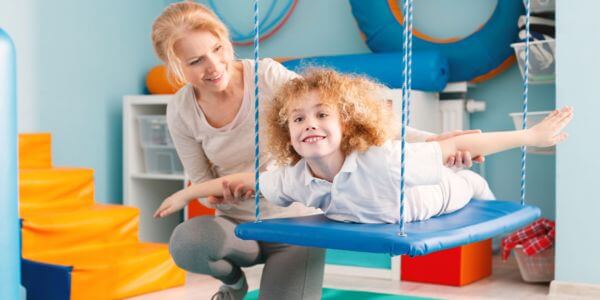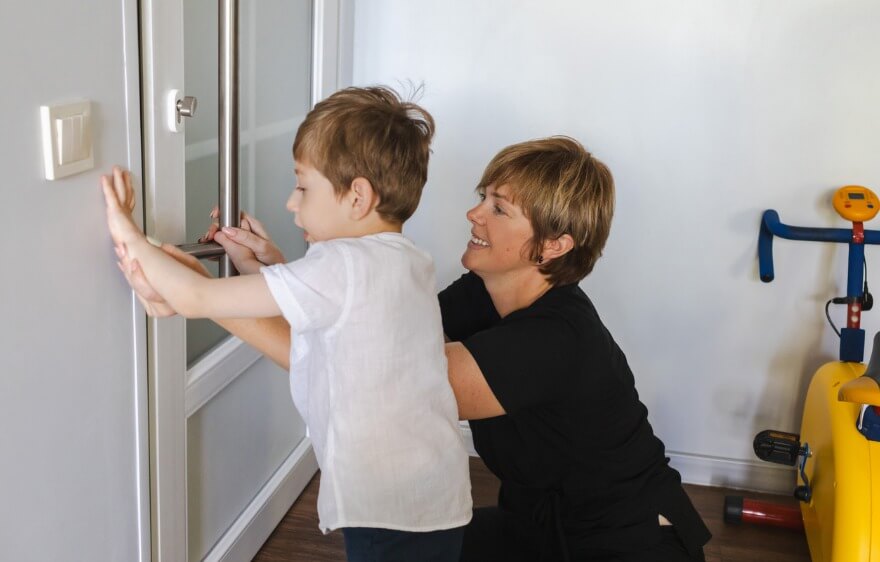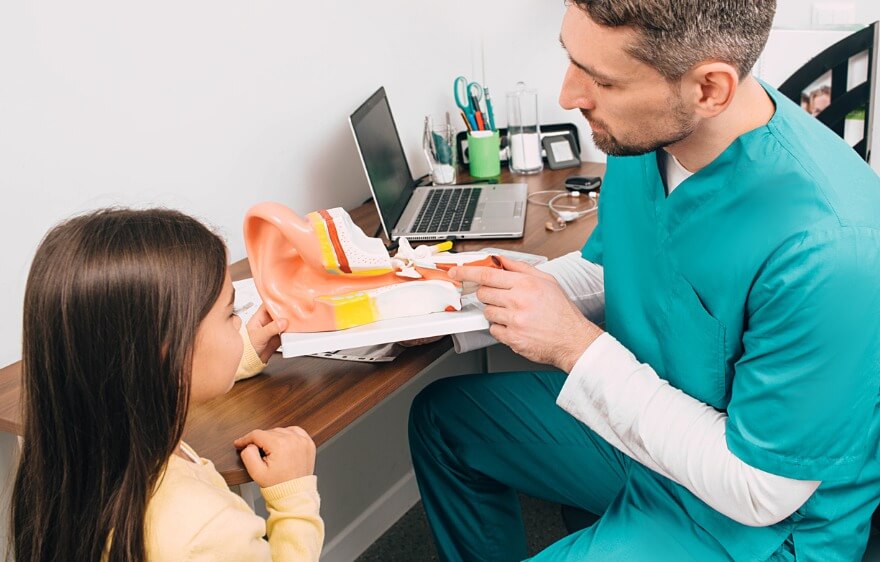For parents and caregivers, witnessing children struggle with the challenges associated with Autism Spectrum Disorder (ASD) can be incredibly overwhelming. From difficulties with social interactions to challenges with motor skills and emotional regulation, every child with ASD has a unique set of needs that require understanding and dedicated support.
In many situations, occupational therapy for autism can offer a wide range of strategies and interventions that help children develop the skills they need to thrive in everyday life. To help you better understand this condition and the available treatment options, we’re covering the benefits of occupational therapy for autism.
Read on for a helpful overview of both autism and occupational therapy, and practical information on the benefits of occupational therapy and how it can make a significant difference in your child’s development.
Understanding the Autism Spectrum and Sensory Sensitivity
Autism Spectrum Disorder (ASD) is a developmental condition that affects how a person perceives and interacts with the world. It is considered a “spectrum” because the symptoms and severity of the condition can vary widely from one individual to another. Common challenges for children with ASD include difficulties with social communication, understanding non-verbal cues, regulating emotions, and engaging in imaginative play.
Children with ASD may also experience sensory sensitivities, such as heightened sensitivity to lights, sounds, or textures, and may struggle with motor coordination. These differences in sensory processing and motor control can make it challenging for children with autism to participate in everyday activities, such as playing with peers, completing schoolwork, or engaging in family routines.
While there is no cure for ASD, early intervention is key to helping children develop coping strategies and life skills that will enable them to succeed. This is where occupational therapy for autism can play a crucial role.
Occupational Therapy for Autism
Occupational therapy for autism is a specialized form of therapy that focuses on helping children with ASD develop and improve the skills they need to function independently in daily life. Whether it’s through enhancing motor skills, improving sensory processing, or creating emotional regulation and social communication, pediatric occupational therapists (OTs) employ a variety of techniques tailored to the unique needs of each child.
The goal of occupational therapy for autism is not only to address the challenges associated with ASD but also to empower children to engage with the world around them in a meaningful way. OTs use play-based activities, structured routines, and adaptive techniques to help children build skills at their own pace while fostering independence, confidence, and a greater sense of self.
The Benefits of Occupational Therapy for Autism
Occupational therapy is an essential part of many children’s treatment plans for ASD. It can help improve key areas of development, including emotional regulation, social skills, and motor abilities. By providing tailored support, OTs work to make everyday activities less challenging and more enjoyable for children with autism. Here are some of the specific benefits:
1. Enhancing Emotional Regulation
Emotional regulation is a common challenge for children with autism. Many children with ASD have difficulty recognizing and expressing their emotions in healthy ways, which can lead to frustration, meltdowns, or even withdrawal from social situations. Pediatric occupational therapists are trained to teach children how to understand and regulate their emotions effectively.
Through techniques such as role-playing, deep breathing exercises, and one-on-one practice, children learn to identify their feelings and develop effective coping mechanisms. Occupational therapy for autism can help children recognize emotional triggers and respond to stress in a calm and controlled way.
OTs also teach children self-soothing strategies that can be used in moments of anxiety or overstimulation. These coping mechanisms help children feel more in control of their emotions, which is vital for reducing frustration and increasing social engagement.
2. Improving Social Skills and Communication
Social interaction can be challenging for children with autism, as they often struggle with maintaining eye contact, understanding nonverbal cues, and engaging in back-and-forth conversations. Pediatric occupational therapists play a critical role in teaching social skills by using structured and repetitive exercises to help children practice these behaviors in a safe and supportive environment.
Occupational therapy for autism may involve activities such as practicing greetings, learning how to share or take turns, and understanding appropriate social cues. Therapists may also use visual supports, like picture schedules or social stories, to break down complex social situations into smaller, more manageable steps.
Over time, these interventions help children with autism feel more comfortable in social settings and improve their ability to communicate with peers, family members, and teachers.
3. Developing Motor Skills
Motor skills, both fine and gross, can be a significant challenge for children with ASD. Fine motor skills encompass tasks like holding a pencil, buttoning a shirt, or using utensils, whereas gross motor skills involve larger movements, such as jumping, running, or balancing. Many children with autism have delays in one or both of these areas.
Occupational therapy for autism focuses on helping children develop strength, coordination, and fine motor skills. For example, OTs may incorporate fine motor skills activities such as building with blocks, threading beads, or practicing jumping and balancing to improve motor control. These exercises help children gain the physical confidence needed to complete everyday tasks.
Therapists may also assist with developing self-care skills, like brushing teeth or tying shoelaces, so that children with autism can achieve greater independence in their daily lives.
4. Addressing Sensory Processing Issues
Sensory sensitivities are common in children with autism, and these can affect how they experience the world. Some children may be hypersensitive to certain textures, sounds, or lights, while others may be under-sensitive, seeking out more intense sensory input. These sensory challenges can interfere with a child’s ability to focus, participate in activities, or even relax.
Occupational therapy for autism helps children understand and manage sensory sensitivities. OTs work with children to develop coping strategies, such as using noise-canceling headphones or incorporating calming sensory tools, like weighted blankets. Through sensory integration activities, children learn how to regulate their sensory experiences and participate in daily routines with greater comfort and ease.
5. Fostering Independence in Daily Living Activities
One of the most significant benefits of occupational therapy for autism is the improvement in a child’s ability to complete everyday tasks independently. Whether it’s getting dressed, preparing a snack, or participating in classroom activities, occupational therapists work with children to improve functional skills that support self-sufficiency.
Therapists break down tasks into smaller, manageable steps and provide support to help individuals master each step. Over time, children with autism can perform more tasks independently, which boosts their confidence and promotes a sense of accomplishment.
6. Building Confidence and Reducing Anxiety
Children with autism often experience feelings of frustration, low self-esteem, or anxiety due to the challenges they face. Occupational therapy for autism addresses these emotional aspects by focusing on building strengths and creating opportunities for individuals to achieve success. As children progress in their treatment, they develop a stronger sense of self-worth and confidence in their abilities.
By mastering new skills and accomplishing tasks, children develop a positive mindset, which can help reduce anxiety and build resilience in the face of difficulties.
7. Improving Academic Performance
Children with ASD often struggle in the classroom due to difficulties with attention, handwriting, organization, and task completion. Occupational therapy for autism can address these challenges by implementing strategies to improve focus and task management. For example, OTs may help children develop strategies for organizing their schoolwork or using assistive technology to support their learning.
By providing children with the tools they need to succeed academically, occupational therapists help improve school performance and promote a positive school experience.
Building Tools for Success
Occupational therapy for autism can have a powerful impact on helping children with ASD overcome the challenges they face in their daily lives. Through targeting areas such as emotional regulation, social skills, motor development, and sensory processing, pediatric occupational therapists provide tailored support to help children thrive.
Whether your child is struggling with social interactions, emotional regulation, or simply navigating daily tasks, occupational therapy for autism can make a world of difference. With the help of customized interventions, children not only improve their functional skills but also develop greater confidence, independence, and self-esteem. If you’re considering occupational therapy for your child, working with one of the caring and dedicated therapists at Care Options for Kids can be a positive step toward unlocking your child’s potential and helping them lead a fulfilling life.
Schedule Your Child’s Care Assessment Today
At Care Options for Kids, we understand the unique challenges of caring for a child with health conditions. Our dedicated team of pediatric home health nurses and therapists is here to support your family with compassionate, expert care tailored to your child’s needs. Contact us today to schedule an assessment and learn how we can help you navigate this journey with confidence and care.
Click here to start your journey to better care.
This post is for educational and informational purposes only. You should always speak with your own therapist before implementing this information on your own.






